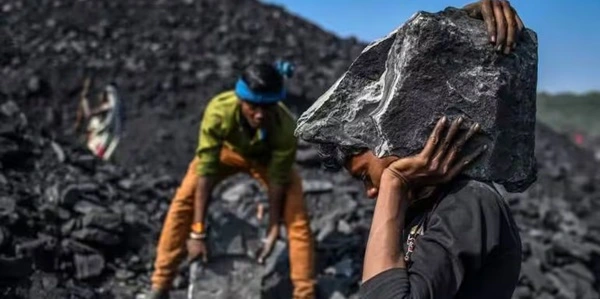India’s coal sector is poised for a significant transformation with an anticipated investment of ₹1.25 lakh crore (approximately $15 billion) in 2024. This ambitious investment aims to bolster domestic coal production, reduce reliance on imports, and support India’s energy security and economic growth.
Boosting Domestic Production
The government’s drive to increase coal production is a core component of its strategy to enhance energy security and support the industrial sector. India’s coal production, led by Coal India Limited (CIL), is set to reach new heights. CIL aims to produce 1 billion tonnes of coal by 2025-26, up from 622 million tonnes in FY22. This increase will be supported by the opening of new mines, enhancing the productivity of existing mines, and adopting advanced technologies.

Infrastructure Development
A significant portion of the investment will focus on improving coal evacuation infrastructure, which is crucial for efficient coal distribution across the country. The Ministry of Coal has undertaken 103 First Mile Connectivity (FMC) projects, including railway sidings near coal mines and the development of a robust coal logistics plan (Coal Ministry). These initiatives aim to replace road transportation with a more efficient and environmentally friendly rail system, reducing carbon emissions and transportation costs.
Cleaner Coal Technologies
In line with global environmental goals, India is also investing in cleaner coal technologies. This includes setting up coal washeries to reduce ash content and improve the quality of coal used in industries, thereby reducing emissions from coal combustion. CIL is planning to operationalize nine new washeries with a capacity of 26.5 million tonnes per annum (MTPA), aiming to supply about 15 million tonnes of washed coking coal to the steel sector.
Enhancing Coking Coal Production
Coking coal, essential for steel production, is a critical area of focus. India’s domestic production of coking coal is set to increase through the development of new mines and the reopening of discontinued ones. The Ministry of Coal has auctioned 16 coking coal blocks to the private sector, expected to start production by 2025. This move is part of the ‘Atmanirbhar Bharat’ initiative, aiming to make India self-reliant in coking coal production.
Economic and Social Impact
The investment in the coal sector is expected to have a substantial economic impact, contributing to GDP growth and creating employment opportunities. The coal sector directly employs about 13 million people, with significant indirect employment in related industries such as transport and heavy machinery. The development of new projects and the expansion of existing ones will generate thousands of jobs and support local economies.
Challenges and Opportunities
Despite the positive outlook, the coal sector faces several challenges. These include environmental concerns, the need for sustainable mining practices, and the social impact of transitioning communities dependent on coal. Moreover, while the investment aims to reduce reliance on coal imports, India still imports a significant portion of its thermal and coking coal, affecting foreign exchange reserves and increasing costs.
Government Initiatives and Policies
The Indian government has introduced several policies to facilitate investment in the coal sector. These include allowing private companies to engage in commercial coal mining and the sale of coal, which was previously restricted to state-owned enterprises. These reforms are expected to attract more private investment and enhance the efficiency and competitiveness of the coal industry.
Conclusion
The substantial investment in India’s coal sector marks a pivotal step towards strengthening the country’s energy security and supporting economic growth. By increasing domestic production, improving infrastructure, and adopting cleaner technologies, India aims to reduce its dependence on coal imports and meet its growing energy demands sustainably. However, balancing economic growth with environmental and social responsibilities remains a critical challenge for the future.

